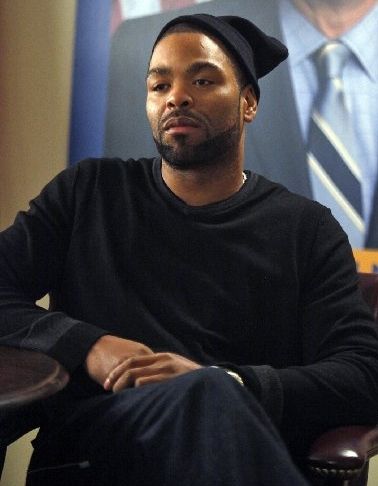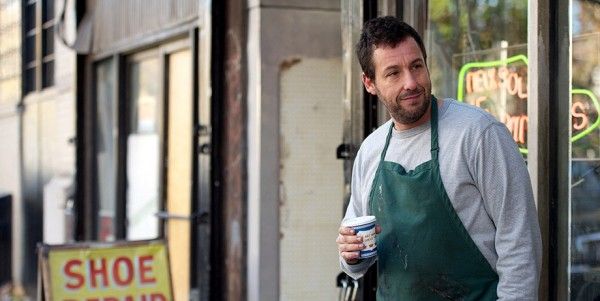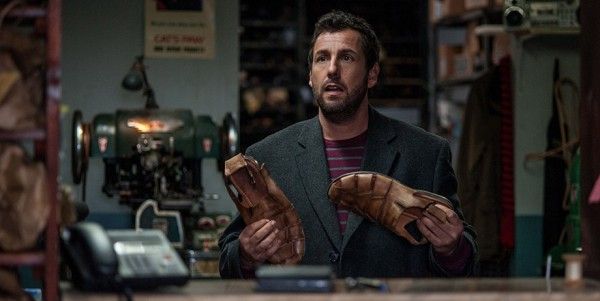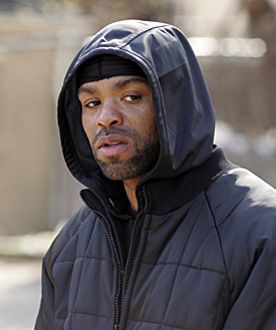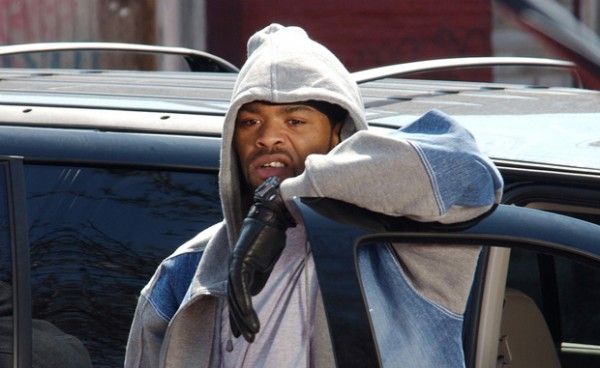One of the many films that premiered at this year’s Toronto International Film Festival was the latest from director Tom McCarthy, The Cobbler. In the modern-day fairy tale, Adam Sandler plays a lonely cobbler in New York City who feels like his life is going nowhere until he discovers a family heirloom that literally gives him the ability to “walk in another man’s shoes,” and see the world differently. The fantastical aspect is a bit of a departure for McCarthy after helming films like The Station Agent, The Visitor, and Win Win, but he still keeps the film focused on the characters. The Cobbler also stars Dustin Hoffman, Steve Buscemi, Ellen Barkin,Melonie Diaz, Method Man, and Dan Stevens.
Shortly after the world premiere I landed an exclusive interview with Ellen Barkin and Clifford Smith (Method Man). They talked about how the project came together, changes during production, what it was like working with Thomas McCarthy, the way they like to prepare for a role/project, social media, the legacy of The Wire, if and when it'll be available in HD, and a lot more. Hit the jump for what they had to say.
Collider: I was telling people that I was going to be talking to you today and it’s an interesting pairing putting the two of you together. What’s it going to take to get the two of you to do some sort of TV show together or some more stuff? Because it would be a very interesting back and forth.
ELLE BARKIN: A little check. That would be about it.
METHOD MAN: There you go, bottom line, she said it best right there.
BARKIN: A little check and I’d be in. We’re actually very similar. We grew up in similar backgrounds.
METHOD MAN: That’s right.
BARKIN: He’s from the outer borough.
MEHTOD MAN: She’s trying to play Staten Island right now [laughs].
BARKIN: We don’t even think about that as a borough, but you know.
METHOD MAN: Right. I’ve got like, millions of Italians that would disagree.
BARKIN: Yeah, firemen and cops, good for you. You got a lot of cops.
METHOD MAN: [Laughs] That’s why they put us together.
BARKIN: That’s right.
The other thing is sometimes I talk to people and they are not active on social media, but the two of you are very active on social media.
BARKIN: He’s so active that he responded to my Ice Bucket Challenge in under one hour.
METHOD MAN: That’s right, that’s right.
BARKIN: My twitter followers were like, “Fastest response ever: Method Man”.
METHOD MAN: That’s right, that’s right.
BARKIN: Fastest response ever.
METHOD MAN: Hey, when you get an OG and they request something, it’s got to get done. Because if you don’t do what the OGs do, you’re done.
BARKIN: It took me 22 hours to sack up to get that water poured on my head. I was like, “I’m not doing it.” I hate cold water. Anything but cold water.
METHOD MAN: [Laughs] I was so game when I seen it. I was like, “What? Ellen needs me to do this, let’s go.”
BARKIN: It was under an hour and it popped up.
Being serious for a second, both of you have been in the biz for a while. How has your process changed as an actor from when you first got started to the way your work now? Have you refined the process at all? Is it a very similar thing that you do all the time?
BARKIN: For me, yes, it’s similar. I think what happens is, because I come from a school of having studied this job for ten years before I went on an audition - some people learn on the set, which I give even more credit to them - I learned in school and the only way it’s become different is like if you’re a musician and you practice your scales. You always practice your scales, but you get quicker at it. If you’re a singer and you do vocal warm ups, it just becomes part of you and you don’t have to think about it. It’s what you do to go to work. So I am very familiar with what I do to go to work and I just do it real fast.
METHOD MAN: Nice.
BARKIN: But I still do the same stuff.
Has it been that way since the beginning? Do you have a very similar routine?
BARKIN: Yeah.
METHOD MAN: For me, it was on set. I got called to do something, like a little cameo appearance as myself and met a few guys, Sam Jackson was one and Peter Berg was the other. A movie came up, Copland, and I kind of went and auditioned for it. They didn’t like my audition, so the person who sent me through for the audition told me, “Why don’t you do what you did in your video?” So I put the eyeball in, put the things in, went in, nailed the audition, and got the part. Then as it started going on more and more, I got this one little part that I did and I felt so uncomfortable doing what I was doing. I was like, “This acting thing isn’t as easy as they make it out to be. I think I need to do some homework really fast or something.” [Laughs] You know? “Send me home with some assignments to do, a few exercises and things.” So due diligence, watching people like Denzel, and the knowledge of the fact that everything is done in stills - they’re all just photos that are moving - with that knowledge, and all the little parts that people have given or I have auditioned for and gotten, all that was a work in progress to where I am now. So yeah, the only difference is the parts that I get now.
BARKIN: There’s great knowledge to be gained just from watching great actors on stage or in movies, there really is, because the more you watch, the more you become educated as to what they’re doing and you say, “Oh, so that’s how he got there.” For you, I have this theory about musicians and being actors and I have not been wrong yet. You know, back in the day you had Sting, he wanted to be an actor, Tom Waits. They were all not good actors and I was always pissed off. I’d be like, “You’re taking food out of some actor’s mouth, but you can’t even do that.”
METHOD MAN: Yeah, yes, I get it.
BARKIN: There is an interesting thing that has been happening over the last twenty years with people who are hip hop artist, rappers, every one can act. And I started to think about why that is. Because the musicians, the straight rock n roll guys, the folk guys, the pop guys – they could not act. Then I started to think, is it because so much of your music is about playing with words?
METHOD MAN: That, and the whole bravado. I’ll give you the best analogy - when a black man’s walking down the street and he wants to scare a white person he acts crazy around them thinking, “Because I’m black you’re going to think I’m crazy and be scared of me because you’re white.”
BARKIN: But I was taught to do that on the subway when I was a young girl and we’d get followed by crazy guys going to high school. My father would say just act crazier and they won’t bother you.
METHOD MAN: [Laughs] It’s just - rappers are great liars.
BARKIN: But it is also an attitude, which you need on film and on stage. I’d like to see someone hit the Broadway stage - well I saw Puff do Raisin in the Sun and he was great. He was great.
METHOD MAN: Mos Def did [Topdog/Underdog].
BARKIN: Oh that was good. I saw that.
METHOD MAN: But he’s good in damn everything he does, man - from rapping to movies.
BARKIN: I think it has to do with you’re so comfortable with language and wordplay and where to put the focus and stress. It’s just natural, because you can’t find someone – Q-tip is great. I was in a movie with him, I’d come to work on the days he’d work, I’d just watch him and say, “You can act, Q”.
METHOD MAN: That’s it. It’s about comfortability, brother.
I appreciate the refreshing honesty in your answer there. A lot of people are afraid to say someone is good or bad.
BARKIN: Oh, I don’t mean Sting is bad, he just can’t act. But then again, I can’t sing [laughs].
I’m a big fan of Thomas McCarthy and the way he directs, he’s a talented guy. What was the experience like working for him? And what was it like on set?
METHOD MAN: A lot of rehearsal in the beginning, lots of rehearsal, from physical to just sitting down at a table reading. On set my job was a little more difficult, because I had to do this dual kind of thing. Tom would walk me through it in steps. We had a systematic number system where it would be percentages. He would tell me, “Alright Cliff, this is what I need. You’re this guy now, but I need you to be 80% this guy and 20% you.” Okay, I can do that. With that scale right there I knew exactly how much to turn up and how much to turn down. Tom’s very hands on and he put in terms where I can understand it and execute it.
BARKIN: He is a joy. I said yes to the movie before I read the script. The Station Agent is one of my favorite movies in the world. I would always stalk him if I saw him at a premiere and tell him how great I thought he was. He called me up and said he had a script and wanted me to do it. I said, “I’m in.” He said, “Don’t you want to read it first?” I said, “I will read it, but I don’t need to read it, I’m in.”
So you’re telling me that stalking works?
BARKIN: Sometimes; I would say not in the dating world or anything like that [laughs].
From when you first got the script to what people are seeing on screen, how much changed along the way?
BARKIN: Well, you know what? I don’t think anything changed.
METHOD MAN: At all.
BARKIN: But I couldn’t believe the movie I saw, because it’s so complicated.
METHOD MAN: It is, yeah, it is. And just the way - like you said, you like his style - I think this right here is very complementary of that style that you love. It just rolls along. I think it keeps people wanting to see what’s going to happen next, because it’s a unique situation that this movie has. You ask yourself, “Huh, I wonder how I would feel if I was living in someone else’s shoes for a minute.”
BARKIN: Like when he’s alone in the very beginning and starts trying on the shoes. I didn’t expect that. I was like, “This is so exciting!” It made me so happy because I was right in his place just trying on eight million pairs of shoes. It was great. I was surprised. Some scripts you read them on the page and they’re fully what they are. This was a great read, I have to say, and I had to read it several times to understand it. I kept saying, “Wait, who’s who? Am I dumb? What’s going on?” So I finally got it, but then when you see it, it really comes alive. And certain performances, like Adam and Cliff, I never saw Cliff be Ludlow, so I didn’t see that character. So that was a great thing to see. I didn’t see Fritz Weaver be Mr. Solomon, I only saw Adam be Mr. Solomon. It’s exciting that way.
In my opinion Adam Sandler is a very underrated actor, I especially love seeing him do drama. He does his thing and then every once in a while he does a film like this. What was it like working with Adam and were you familiar with all his other films like Happy Gilmore?
METHOD MAN: I was quoting his ear off at first.
BARKIN: I’m a huge fan.
METHOD MAN: Yeah, I’m a huge fan and I think Adam tapped into a vein at that time in comedy where it was the everyman’s comedy. Every man could relate to it whether you were 8 years old or 88 years old.
BARKIN: That’s right. His comedy, to me, it’s just so unique. He really did create a whole new world of comedy, and it is what Cliff said earlier, that blue-collar thing where all the sudden he was just a guy. And it was great. Look, he has this in his resume. He has Punch Drunk Love. Someone asked me “What’s it like acting with a comedian?” And I said, “I don’t think of Adam Sandler as a comedian.” Richard Pryor was a comedian who also acted in some movies and was brilliant. Adam Sandler is an actor. He’s a comic actor 80% of the time, but he’s still an actor. And he’s a real character actor, he’s got some chops.
I completely agree. And he’s having a good TIFF with this and Men, Women and Children.
BARKIN: That’s right. What’s TIFF? Oh, Toronto International Film Festival.
METHOD MAN: Yeah
I say that a lot and I keep on thinking people know it.
BARKIN: I keep thinking they’re saying breasts and I’m like why are you talking about my tits? Is my bra undone?
METHOD MAN: [Laughs] Oh my god.
BARKIN: Seriously.
I’m a huge fan of The Wire.
METHOD MAN: Thank you, sir.
The show is incredible and recently in the last week or two it came out that they’re remastering it in HD.
BARKIN: They are?
METHOD MAN: Yeah, they are. So you get to see my brains get splattered all over the place in high def now.
BARKIN: No.
METHOD MAN: Yes!
BARKIN: When’s it coming out?
METHOD MAN: I’m not sure.
[Laughs] That’s what I wanted to ask you.
METHOD MAN: I’m not sure.
The concept of The Wire on Blu-ray or airing in HD, there are so many people that are so excited, so what do you know that hasn’t been reported?
METHOD MAN: Nothing. And I think that’s how David and them like it. Even when we used to show up to set to work, whatever the script was, you wasn’t sure if you were going to get that when you came on set. So no, I don’t know anything. And even if I did know, I don’t know anything. You think I want Marlow or Omar coming after me? No.
BARKIN: Oh, I can’t wait for that. You know, I like to go back to The Wire every year or so, just pick a season.
METHOD MAN: Yeah, man. [Laughs] It’s on my computer right now. My personal favorite season, I believe, was the third season when they focused on the schools and the kids, bring it home.
I think it’s one of those rare shows where every season is just incredible. For the two of you, what do you think it is about the show that has made it everlasting where people are still talking about it and it’s still revered? If anything it’s finally starting to get the mainstream press and more people talking about it, because when it was on it couldn’t get an award to save its life.
BARKIN: Right.
METHOD MAN: Right, I think word of mouth is a hell of a thing. The Wire, it was true to form. It was true to its area where it was filmed at. From the first season when they started with the drug dealers and the cops, the conflict there, to even the second season, which got a lot of people mad, but how could you go to Baltimore, Maryland and not deal with the docks? So they had to deal with the docks. And then the third season with the school and the kids, then the fourth season with the politicians, then it was the newspaper thing when Tom came on with the whole serial killer thing and all that. But every facet of Baltimore culture, they touched. People that know authenticity, see authenticity, not just in those backdrops but in the characters too.
BARKIN: Also The Wire was really groundbreaking television that really set a precedent. I mean, you could go back to Homicide, but that was a little different. The Wire, now every show on TV is there because of The Wire. If you think about it, it’s its own genre that is now called “like The Wire”.
METHOD MAN: [Laughs] Yeah, there you go, exactly.
It’s true.
BARKIN: It’s true. It introduced - and I think it’s that, what you just said - a level of authenticity to the crime drama. You know, maybe Homicide had part of it, but the race culture - it introduced topics that before that were danced around, and that’s what the show was about. So instead of having a couple of fringe characters, this was your cast and they were in this city operating the way that it really happens. And it was groundbreaking television and I think was really the template for all these shows.
It definitely opened up the door in terms of what you could show on TV and get away with. It’s also interesting, I’ve read recently that the show is being taught in colleges and people are getting in there and dissecting it. That’s just amazing.
METHOD MAN: [Laughs] What do you mean? As far as film students?
No, just in general, to talk about culture.
METHOD MAN: Wow.
BARKIN: And also look at the talent that came out of The Wire.
METHOD MAN: Idris, Dom.
BARKIN: Look what happened there.
Have you ever censored yourself? Because both of you tweet a lot. Have you ever censored yourself when you’re about to hit post and you’re like “Oh fuck, I can’t do that”?
BARKIN: You know, I started something three months ago. I said, “I’m not going curse anymore in my tweets.”
METHOD MAN: Wow.
BARKIN: Me, the girl who won the USA Herald Tribune contest for who says “motherfucker” more in their tweets, Ellen Barkin or Sam Jackson? Guess who the winner was. Sam was not happy about that. Three months ago I said, “I’m never cursing in my tweets.” Do you know that I have not gotten one new follower since then? And they tweet me and say, “Ellen, we miss your fucks. We miss your motherfucks.” I’m not doing it anymore. So yes, I censor myself constantly. I censored myself all through this interview [laughs].
METHOD MAN: For me, well let’s put it this way - I don’t curse anymore in my rhymes. I personally challenged myself to do that and now I like it so much I don’t do it anymore. I don’t curse around my mom still, to this day, or my mother in law, to this day. I never cursed in front of them.
BARKIN: You don’t curse in front of kids?
METHOD MAN: Yeah. [Laughs] Hell yeah, I let go. But twitter - I need someone to reel me in, because I just deleted like thousands of tweets by hand off my phone because I got in a heated argument with somebody. It was just ugly.
BARKIN: It’s bad.
METHOD MAN: Yeah, it was really bad.
BARKIN: I got in trouble with the cops.
METHOD MAN: See, I didn’t go that far.
BARKIN: I did.
METHOD MAN: But I did call a woman out of her name because I was mad. I was like, “You know what? This social media thing aint for everybody.” So now the majority of my tweets are Steven Wright quotes and potty humor. That’s it.
BARKIN: [Laughs] “I had a good iced tea. Bye.”
METHOD MAN: [Laughs] That’s it.
What are you guys doing in the future? What’s coming up for you?
METHOD MAN: Wu-Tang and movies. Trainwreck with Amy Shumer and the Wu-Tang twentieth anniversary album.
BARKIN: I’m doing a movie in November in Germany, and I’m producing a Richard Yates novel called The Easter Parade.
I started off the interview saying TV show and I’m going to end it with the same thing – the two of you doing more stuff together.
BARKIN: Situational comedy?



